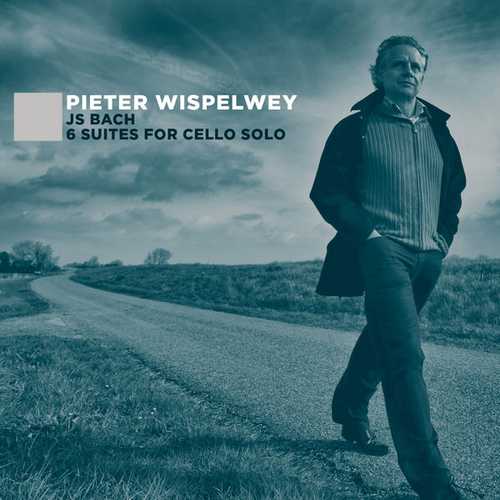
Composer: Johann Sebastian Bach
Performer: Pieter Wispelwey
Format: FLAC (tracks)
Label: EPR
Release: 2012
Size: 2.23 GB
Recovery: +3%
Scan: yes
Cello Suite No. 1 in G major, BWV1007
01. Prelude
02. Allemande
03. Courante
04. Sarabande
05. Menuet I and II
06. Gigue
Cello Suite No. 2 in D minor, BWV1008
07. Prelude
08. Allemande
09. Courante
10. Sarabande
11. Menuet I and II
12. Gigue
Cello Suite No. 3 in C major, BWV1009
13. Prelude
14. Allemande
15. Courante
16. Sarabande
17. Bourrée I and II
18. Gigue
Cello Suite No. 4 in E flat major, BWV1010
19. Prelude
20. Allemande
21. Courante
22. Sarabande
23. Bourrée I and II
24. Gigue
Cello Suite No. 5 in C minor, BWV1011
25. Prelude
26. Allemande
27. Courante
28. Sarabande
29. Gavotte I and II
30. Gigue
Cello Suite No. 6 in D major, BWV1012
31. Prelude
32. Allemande
33. Courante
34. Sarabande
35. Gavotte I and II
36. Gigue
Celebrating his 50th birthday, this recording of Bach’s Complete Cello Suites is Pieter Wispelwey’s third recording of the repertoire, but probably his most controversial!
Based on extensive research by Laurence Dreyfus and John Butt (from the Dunedin Consort), Pieter tuned his strings down to a pitch of 392 for this recording, and the resulting sound is a very rich, sonorous experience. His cello also has gut strings for this recording and is played with a short bow.
The suites are set out on disc in a chronological order, so you can listen for yourself to see if you can hear the difference in pitch and whether you prefer this recording over his others!
Beautifully packaged in a slim box set, the recording contains a double disc of the Bach Suites and also a bonus DVD where Pieter talks about the recording. Priced as a mid price double, this recording will be a must have for all fans of Bach.
OK, are you ready for something completely different? From someone who has already recorded two complete sets of Bach’s six suites for solo cello, BWV 1007-1012, no less? Where to begin? Dutch historical-performance specialist Pieter Wispelwey disregards the long performance tradition associated with these six suites, which seem like cousins to Bach’s sonatas and partitas for solo violin but are actually quite different in character (there are no sonatas, for one thing). Even players of the Baroque cello sometimes seem to have Pablo Casals’ magisterial recordings in their heads, but Casals is not in the building at all for these readings. They seem to rest on three principles. First and foremost, Wispelwey has drawn on Baroque theories of rhetoric in constructing his interpretation. These were certainly in the air when Bach composed these works, although why they should apply specifically to the cello suites is less clear. Each phrase in Wispelwey’s reading is like a spoken utterance. Notes are cleanly cut off, with very little legato, and the tempo is freely varied as speech might be. Second, Wispelwey’s tempi are unorthodox in the extreme, tending mostly toward the fast side. Plunge in and sample the opening movement of the Suite for solo cello in G major, BWV 1007, for an idea of what you’re getting into here. Third, although Wispelwey is not the first performer to de-emphasize the dance rhythms in these suites, he diverges from them to an unusual degree. Each of the dance movements is almost a character piece in the vein of Couperin, but with an entirely different set of instrumental textures. Throw in growling cello textures due to A=392 tuning, said to be authentic to the city of Köthen where the suites were written, and you get extremely un-song-like utterances throughout. It may all seem to add up to something with only a passing resemblance to what Bach wrote, but Wispelwey has the chops to pull this off, and there’s an appealing sense of drilling deep into the music here. The sound from the ominously named Evil Penguin label, way too close up, is a disincentive even so, and this is probably not a good choice for those new to the music. Listeners will ultimately have to make up their own minds about this experiment, but it commands attention.



